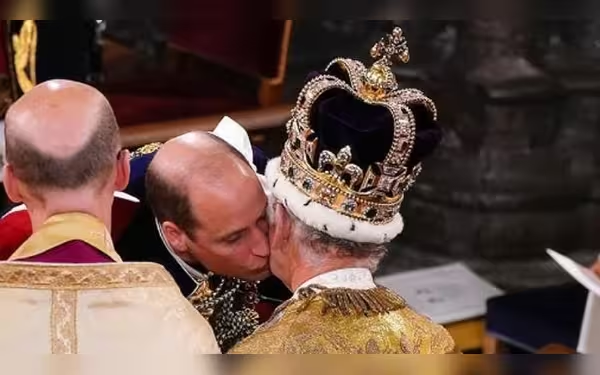Saturday, November 16, 2024 04:29 PM
Prince William's Potential Changes to Monarchy
- Prince William may abolish coronation religious oaths.
- Modernization could redefine monarchy's relationship with the Church.
- Future of monarchy hinges on adapting to societal changes.
 Image Credits: thenews
Image Credits: thenewsPrince William considers abolishing religious oaths at coronation, potentially redefining the monarchy's future.
As the world watches the British monarchy evolve, Prince William, the Prince of Wales, is reportedly contemplating a significant change that could redefine the future of the royal family. This potential shift comes as he prepares for his eventual ascension to the throne, a moment that carries with it centuries of tradition and expectation. The monarchy has long been intertwined with the Church of England, and any alteration to this relationship could have far-reaching implications.
Recently, it has been reported that Prince William is "toying with" the idea of abolishing the religious oaths traditionally taken during the coronation ceremony. This move would mark a departure from the established norms that have governed the monarchy for generations. At King Charles's coronation last year, William was the only member of the House of Windsor to participate in the Homage of Royal Blood, where he pledged to be his father's "liege man of life and limb." This ceremony has historically included all royal dukes, but King Charles opted for a more modern approach, incorporating multi-faith elements to reflect the diverse religious landscape of the United Kingdom.
Prince William's consideration of this modernization could lead to the disestablishment of the Church of England, a significant shift that contrasts sharply with King Charles's strong religious convictions. As the current monarch, Charles holds the titles of Defender of the Faith and Supreme Governor of the Church of England, emphasizing the deep-rooted connection between the monarchy and the church. The coronation ceremony is predominantly Christian, where the monarch swears to uphold and protect the Church of England while ensuring a Protestant succession.
For centuries, the monarchy and the Church of England have supported one another, creating a stable foundation for both institutions. However, if Prince William proceeds with his plans, it could pose challenges for the monarchy, which relies heavily on the continuity of its customs. The potential break from tradition raises questions about the future role of the monarchy in a rapidly changing society.
As Prince William contemplates these significant changes, it is essential to consider the broader implications for the monarchy and the Church of England. The relationship between these two institutions has shaped British history, and any alterations could redefine their roles in modern society. While change can be daunting, it also presents an opportunity for growth and adaptation. The future of the monarchy may very well depend on how it navigates these evolving dynamics, ensuring that it remains relevant in the hearts and minds of the people it serves.













